Premium Only Content
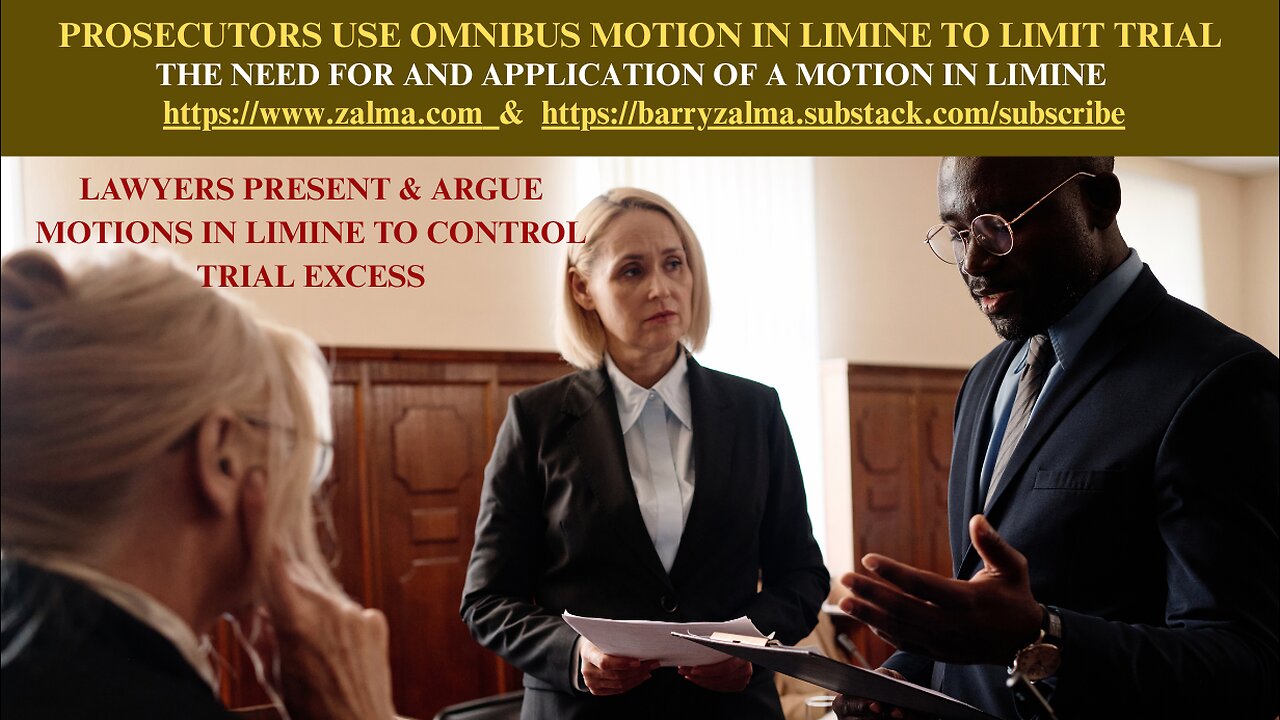
Prosecutors Use Omnibus Motion in Limine to Limit Trial
The Need For and Application of a Motion in Limine
Post 5153
Lawyers Present & Argue Motions in Limine to Control Trial Excess
In United States Of America v. Scharmaine Lawson Baker, Criminal Action No. 24-99, USDC, E.D. Louisiana (July 7, 2025) Scharmaine Lawson Baker was charged with six counts of health care fraud. She pled not guilty, and her trial was scheduled.
BACKGROUND
Government's Omnibus Motion in Limine
The Government filed an omnibus motion in limine which included several requests to exclude certain types of evidence and arguments.
Exclusion of Evidence and Argument Related to Specific Instances of “Good Deeds” and “Law-Abidingness”
The Government argued that such evidence is irrelevant and improper character evidence.
The Court granted the motion, stating that the defendant's character is not an essential element of the charges.
Testimony About Defendant's Own Hearsay Statements
The Government sought to preclude the defendant from introducing her own self-serving statements as inadmissible hearsay.
The Court deferred ruling on this request, requiring specific statements to be identified for admissibility assessment.
Use of Interview Reports to Impeach Government Witnesses
The Government requested to preclude the defendant from using interview reports to impeach witnesses unless the statements were verbatim or adopted by the witnesses.
The Court deferred ruling, requiring a factual determination on the nature of the statements.
Unopposed Motions in Limine
The Court granted several unopposed motions, including:
Exclusion of arguments suggesting selective prosecution.
Preclusion of comments on the Government's failure to call a particular witness.
Exclusion of plea negotiations and related statements.
Exclusion of evidence blaming Medicare as the victim.
Exclusion of evidence related to harm or prejudice caused by the indictment.
Preclusion of arguments for acquittal based on reasons other than evidence and law.
DISCUSSION
Evidence And Argument Related To Specific Instances Of “Good Deeds” And “Law Abidingness”
The government argued that evidence and argument related to specific instances of “good deeds” and “law-abidingness,” including evidence of defendant's legitimate billing or legitimate services, as circumstantial proof that she is not guilty, should be excluded. Defendant argued that honesty is a pertinent character trait to 18 U.S.C. § 1347, and defendant should not be precluded from introducing any character evidence.
Federal Rules of Evidence 404 states: “Evidence of a person's character is not admissible to prove that on a particular occasion the person acted in accordance with the character or trait.”
Defendant was charged with six counts of health care fraud. Defendant's character is not an essential element of the charges against her. Accordingly, the Court granted the government's motion to exclude evidence and argument related to specific instances of “good deeds” and “law abidingness.”
Testimony About Defendant's Own Hearsay Statements To Witnesses Or Other Third Parties
The government asked to preclude defendant from attempting to elicit or admit her own self-serving statements made to law enforcement agents, government investigators, or other witnesses as inadmissible hearsay. Defendant argued that granting the government's motion would deny defendant the right to respond to inaccuracies, embellishments, and mischaracterizations introduced by the government through the defendant's inculpatory statements.
Without viewing the statements that defendant seeks to admit, the Court could not rule on a blanket request to prohibit the introduction of defendant's own statements.
Use Of Interview Reports Prepared By Law Enforcement Agents To Impeach Government Witnesses
The government sought to preclude defendant from introducing an interview report to impeach a witness as a prior inconsistent statement of anyone other than the report's author. The Court could not issue a blanket ruling without first deciding whether the statements were verbatim, or whether the witnesses had subscribed to or otherwised adopted the statements as their own.
Evidence And Argument That The Defendant Should Be Acquitted For Reasons Other Than The Evidence And The Law
Jury nullification is not a right belonging to the defendant. Jury nullification is not desirable and that trial judges should exercise their power to prevent it when possible. The USDC categorically rejected the idea that, in a society, committed to the rule of law, jury nullification is desirable or that courts may permit it to occur when it is within their authority to prevent. Accordingly, the Court granted the government's motion to preclude defendant from introducing evidence and argument that she should be acquitted for reasons other than the evidence and the law.
ZALMA OPINION
The government, faced with a well represented counsel seeking to avoid conviction for health insurance fraud, with evidence that is inappropriate. To protect the government's case and to reduce irrelevant and useless testimony, the blanket motion in limine was partially successful and the trial judge will rule on other evidentiary attempts during trial when the evidence can be reviewed. The jury in the case will appreciate the limitations on presentation of inappropriate evidence by the defense.
(c) 2025 Barry Zalma & ClaimSchool, Inc.
Please tell your friends and colleagues about this blog and the videos and let them subscribe to the blog and the videos.
Subscribe to my substack at https://barryzalma.substack.com/subscribe
Go to X @bzalma; Go to Barry Zalma videos at Rumble.com at https://rumble.com/account/content?type=all; Go to Barry Zalma on YouTube- https://www.youtube.com/channel/UCysiZklEtxZsSF9DfC0Expg; Go to the Insurance Claims Library – https://lnkd.in/gwEYk.
-
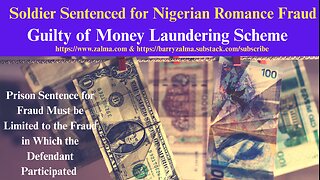 10:51
10:51
Insurance Law
2 days agoSoldier Sentenced for Nigerian Romance Fraud
191 -
 LIVE
LIVE
LFA TV
9 hours agoLIVE & BREAKING NEWS! | FRIDAY 12/05/25
4,649 watching -
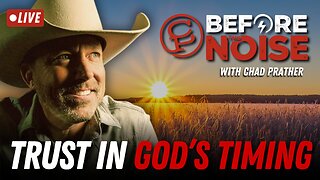 LIVE
LIVE
Chad Prather
14 hours agoHow To Be Used By God By Mastering Patience!
7,513 watching -
 LIVE
LIVE
Game On!
16 hours agoHAPPY FOOTBALL FRIDAY! NFL Week 14 Betting Preview!
599 watching -
 1:05:41
1:05:41
Crypto Power Hour
10 hours ago $2.74 earnedBlockchain Solutions w/ U.S. Healthcare Featuring Solum Global
21.2K9 -
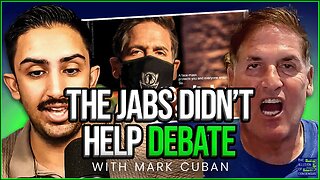 1:18:24
1:18:24
The Illusion of Consensus
1 month ago“Your Math Is WRONG” - Mark Cuban GRILLED Over His NBA COVID Vaccine Mandate | Part 2
3.15K10 -
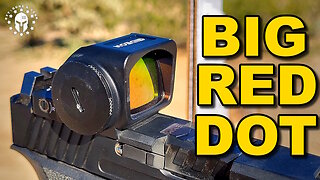 14:17
14:17
RTT: Guns & Gear
16 hours ago $2.33 earnedBest Budget RMR Red Dot 2025? Gideon Optics Granite Review
5.58K3 -
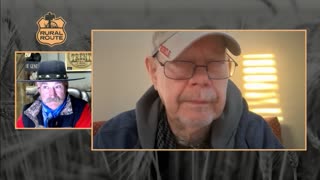 LIVE
LIVE
BEK TV
23 hours agoTrent Loos in the Morning - 12/05/2025
294 watching -
 LIVE
LIVE
The Bubba Army
22 hours agoWill Michael Jordan TAKE DOWN NASCAR - Bubba the Love Sponge® Show | 12/05/25
1,317 watching -
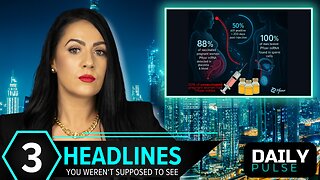 35:55
35:55
ZeeeMedia
15 hours agoPfizer mRNA in Over 88% of Human Placentas, Sperm & Blood | Daily Pulse Ep 156
10.1K106